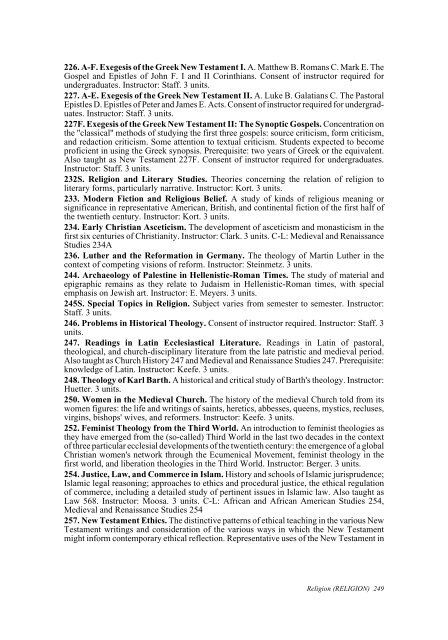2005-06 - Office of the Registrar - Duke University
2005-06 - Office of the Registrar - Duke University
2005-06 - Office of the Registrar - Duke University
Create successful ePaper yourself
Turn your PDF publications into a flip-book with our unique Google optimized e-Paper software.
226. A-F. Exegesis <strong>of</strong> <strong>the</strong> Greek New Testament I. A. Mat<strong>the</strong>w B. Romans C. Mark E. The<br />
Gospel and Epistles <strong>of</strong> John F. I and II Corinthians. Consent <strong>of</strong> instructor required for<br />
undergraduates. Instructor: Staff. 3 units.<br />
227. A-E. Exegesis <strong>of</strong> <strong>the</strong> Greek New Testament II. A. Luke B. Galatians C. The Pastoral<br />
Epistles D. Epistles <strong>of</strong> Peter and James E. Acts. Consent <strong>of</strong> instructor required for undergraduates.<br />
Instructor: Staff. 3 units.<br />
227F. Exegesis <strong>of</strong> <strong>the</strong> Greek New Testament II: The Synoptic Gospels. Concentration on<br />
<strong>the</strong> ''classical'' methods <strong>of</strong> studying <strong>the</strong> first three gospels: source criticism, form criticism,<br />
and redaction criticism. Some attention to textual criticism. Students expected to become<br />
pr<strong>of</strong>icient in using <strong>the</strong> Greek synopsis. Prerequisite: two years <strong>of</strong> Greek or <strong>the</strong> equivalent.<br />
Also taught as New Testament 227F. Consent <strong>of</strong> instructor required for undergraduates.<br />
Instructor: Staff. 3 units.<br />
232S. Religion and Literary Studies. Theories concerning <strong>the</strong> relation <strong>of</strong> religion to<br />
literary forms, particularly narrative. Instructor: Kort. 3 units.<br />
233. Modern Fiction and Religious Belief. A study <strong>of</strong> kinds <strong>of</strong> religious meaning or<br />
significance in representative American, British, and continental fiction <strong>of</strong> <strong>the</strong> first half <strong>of</strong><br />
<strong>the</strong> twentieth century. Instructor: Kort. 3 units.<br />
234. Early Christian Asceticism. The development <strong>of</strong> asceticism and monasticism in <strong>the</strong><br />
first six centuries <strong>of</strong> Christianity. Instructor: Clark. 3 units. C-L: Medieval and Renaissance<br />
Studies 234A<br />
236. Lu<strong>the</strong>r and <strong>the</strong> Reformation in Germany. The <strong>the</strong>ology <strong>of</strong> Martin Lu<strong>the</strong>r in <strong>the</strong><br />
context <strong>of</strong> competing visions <strong>of</strong> reform. Instructor: Steinmetz. 3 units.<br />
244. Archaeology <strong>of</strong> Palestine in Hellenistic-Roman Times. The study <strong>of</strong> material and<br />
epigraphic remains as <strong>the</strong>y relate to Judaism in Hellenistic-Roman times, with special<br />
emphasis on Jewish art. Instructor: E. Meyers. 3 units.<br />
245S. Special Topics in Religion. Subject varies from semester to semester. Instructor:<br />
Staff. 3 units.<br />
246. Problems in Historical Theology. Consent <strong>of</strong> instructor required. Instructor: Staff. 3<br />
units.<br />
247. Readings in Latin Ecclesiastical Literature. Readings in Latin <strong>of</strong> pastoral,<br />
<strong>the</strong>ological, and church-disciplinary literature from <strong>the</strong> late patristic and medieval period.<br />
Also taught as Church History 247 and Medieval and Renaissance Studies 247. Prerequisite:<br />
knowledge <strong>of</strong> Latin. Instructor: Keefe. 3 units.<br />
248. Theology <strong>of</strong> Karl Barth. A historical and critical study <strong>of</strong> Barth's <strong>the</strong>ology. Instructor:<br />
Huetter. 3 units.<br />
250. Women in <strong>the</strong> Medieval Church. The history <strong>of</strong> <strong>the</strong> medieval Church told from its<br />
women figures: <strong>the</strong> life and writings <strong>of</strong> saints, heretics, abbesses, queens, mystics, recluses,<br />
virgins, bishops' wives, and reformers. Instructor: Keefe. 3 units.<br />
252. Feminist Theology from <strong>the</strong> Third World. An introduction to feminist <strong>the</strong>ologies as<br />
<strong>the</strong>y have emerged from <strong>the</strong> (so-called) Third World in <strong>the</strong> last two decades in <strong>the</strong> context<br />
<strong>of</strong> three particular ecclesial developments <strong>of</strong> <strong>the</strong> twentieth century: <strong>the</strong> emergence <strong>of</strong> a global<br />
Christian women's network through <strong>the</strong> Ecumenical Movement, feminist <strong>the</strong>ology in <strong>the</strong><br />
first world, and liberation <strong>the</strong>ologies in <strong>the</strong> Third World. Instructor: Berger. 3 units.<br />
254. Justice, Law, and Commerce in Islam. History and schools <strong>of</strong> Islamic jurisprudence;<br />
Islamic legal reasoning; approaches to ethics and procedural justice, <strong>the</strong> ethical regulation<br />
<strong>of</strong> commerce, including a detailed study <strong>of</strong> pertinent issues in Islamic law. Also taught as<br />
Law 568. Instructor: Moosa. 3 units. C-L: African and African American Studies 254,<br />
Medieval and Renaissance Studies 254<br />
257. New Testament Ethics. The distinctive patterns <strong>of</strong> ethical teaching in <strong>the</strong> various New<br />
Testament writings and consideration <strong>of</strong> <strong>the</strong> various ways in which <strong>the</strong> New Testament<br />
might inform contemporary ethical reflection. Representative uses <strong>of</strong> <strong>the</strong> New Testament in<br />
Religion (RELIGION) 249









